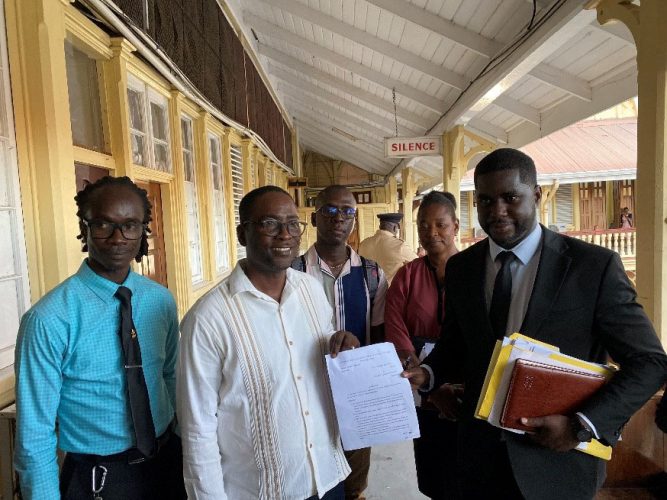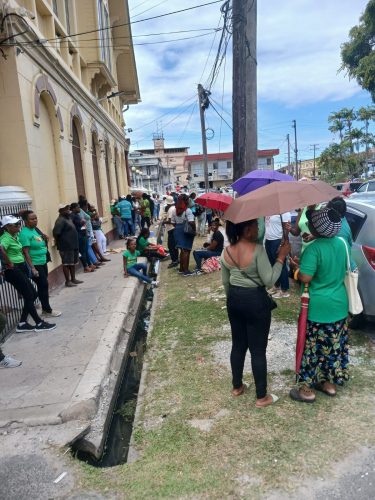Court-ordered mediation yesterday succeeded in bringing a four-week-old teachers’ strike to an end and their union, the GTU will now be able to place salaries and collective bargaining on the table when talks begin with the Ministry of Education sometime this week.
After two days of gruelling talks, the mediation ordered on Thursday by Justice Sandil Kissoon produced results yesterday afternoon – breaking a deadlock that was entering its 5th week with the Ministry of Labour and the Chief Labour Officer refusing to bring the government and the union to the table and to find a way to end the strike.
The agreement reached between the two sides said that the teachers will resume work on or before Wednesday, March 6th, 2024.


Discussions shall then proceed within 48 hours of resumption of work and shall be in relation to those matters which either party considers relevant for discussion between the union and government which includes financial matters. The reference to financial matters is pivotal to the Guyana Teachers Union (GTU) as the government has imposed salary increases over the last four years without any negotiations with it.
These discussions will take place in the boardroom of the Ministry of Education.
The agreement said that “Both parties reserve all their rights pursuant to any agreement or the laws of Guyana”.
In the agreement, the government reiterated its commitment to acting in good faith and in accordance with the laws of the country throughout the discussions. Meanwhile, the GTU also pledged to continue negotiating in good faith for the welfare of teachers.
GTU President Mark Lyte, along with the union’s Attorney Darren Wade, state legal representative Darshan Ramdhani KC and Chief Education Officer (CEO) Saddam Hussain, signed the agreement.
Ramdhani told reporters after the agreement was signed that he is pleased that teachers will resume duties by tomorrow. He noted that the country is at a critical time at school because there are School Based Assessments (SBA) and common entrance examination issues to be addressed. Ramdhani said the union requested in the beginning of the mediation process for all issues to be discussed.
GTU’s President, Lyte, meanwhile explained to reporters that the union was able to secure an agreement with the government after many years. Lyte said the government has agreed to discuss financial matters with the union with the union committing teachers to return to the classrooms. There are several other non-financial issues included for discussion, including teachers’ housing and additional duty-free concessions. Lyte said that the agreement is not an ordinary terms of resumption but it is one that was ordered by the court.
“We’ve finally been able to have an agreement with the government after all these years to come to the table to discuss our potent, pertinent, financial issues. I think what makes the difference here is it’s not just an ordinary resumption or agreement, it’s one that is ordered by the court and we have seen an attempt to comply with the court order so far so that gave us some level of optimism.”
Wade explained that the signed agreement has to be acted upon in good faith and the burden is on the government to ensure that the teachers’ issues are addressed. The binding agreement signed is one in which the government is ordered to have a meeting within 48 hours. If the government fails to comply with the court order, they will be summoned to return to court. The matter of potential salary deductions and the GTU monthly dues are still before the court.
The mediators appointed by Justice Kissoon were senior counsel Eddie Luckhoo and Robin Stoby.
The GTU’s industrial action commenced on February 5th and was initially slated to last for ten days, but actions by the government led to its continuation for over a month. There was substantial support for it all across the country particularly in Region Two, a development which seemed to have surprised the government. Teachers also went on strike across Berbice.
Just before the commencement of the strike, GTU General Secretary Coretta McDonald had expressed frustration with the government’s handling of negotiations.
Before the commencement of the strike, as it began, and throughout its progression, it was deemed political and illegal by members of the government including the Ministry of Education (MoE), the Ministry of Labour (MoL), and Vice President (VP) Bharrat Jagdeo. As time progressed, the union in turn maintained that the strike was lawful as they had exhausted all avenues for wage talks with the government since 2020.
According to the union, a proposal that they submitted in 2020, spanning from 2020 to 2023, did not receive a response from the government. Additionally, attempts to request conciliation and arbitration with the MoL were unsuccessful.
Despite the union’s claims, correspondence from the Chief Labour Officer (CLO) Dhaneshwar Deonarine to the GTU showed him pointing out that the grievance procedure had not been exhausted, as per the agreement between the union and the MoE. Before this correspondence had been sent out, the GTU had written to the CLO seeking arbitration as financial matters were not addressed by the MoE, and an arbitrator mutually agreed upon by both parties was requested to commence the process.
However, no response was received from the CLO regarding the request for arbitration and the union resorted to declaring full-fledged industrial action due to the government’s failure to address their concerns, including wage increases and non-salary benefits, lack of response from the CLO, and unresolved matters impacting the stability of the education system. In its correspondence to the government to inform them of the planned strike action, the GTU had requested an urgent meeting with the MoE to discuss these matters and avoid disruption in the educational system.
After the letter on the planned industrial action was sent out, the CLO finally reached out to the GTU, urging that they refrain from taking industrial action, emphasizing the importance of following the grievance procedure in good faith for industrial relations practice. Deonarine further advised against breaching or violating the Memorandum of Agreement between the GTU and the Ministry.
Deduction
One day after the strike began, the MoE made its first move against teachers by announcing its plan to discontinue the deduction of union dues on behalf of teachers. In a press release issued by the ministry on February 6, the MoE explained that the decision to cease deductions was made per a ruling by Chief Justice Ian Chang in the case of Guyana Public Service Union v Nanda Gopaul.
The release cited the ministry as labeling the industrial action unlawful, racist, and divisive. Further, it said that the majority of the union’s requests were agreed upon by the MoE, and the ministry implemented several initiatives to benefit teachers nationwide.
The ministry then took things a step further, on February 12, vowing to cut the salaries of striking teachers. In response to this, the GTU threatened and made good on its threat to take the government to court over the MoE’s actions.
After the union’s statement of claim against the state was filed on February 14, the government, through Attorney General (AG) Anil Nandlall SC and its other legal representatives, made an application for a 14-day grace period to come up with a response. This was granted and the matter is set to be heard on March 20. Justice Kissoon, who granted the extension, also ruled that the status quo be maintained, thereby stalling the deduction of strike days from teachers’ salaries and maintaining the deduction of union dues, pending the outcome of the matter. It was these orders that eventually led to the Judge asking why there were no talks between the two sides and eventually ordering mediation.
On February 27, the CEO Hussain was summoned before Justice Kissoon after being found in contempt of court for issuing a circular which stated that teachers’ salaries will still be subject to deductions and that the court’s ruling was temporary. Hussain apologised to the judge, who, after accepting the apology, suggested that a mediation meeting be held in court between the two parties.
The GTU readily agreed to the meeting taking place the following day, but Nandlall asked the court for 24 hours to confer with his superiors before making a decision. The following day, despite Nandlall’s disagreement with mediation, Justice Kissoon ordered that the meeting be held under the mediation of Senior Counsel Edward Luckhoo and Robin Stoby.
The mediation meetings commenced on Friday and were adjourned in the afternoon and recommenced yesterday during which time the decision was made for teachers to return to the classroom. As the news of the agreement spread, Lyte took to the GTU FB page to officially encourage teachers to return to work.
In the comments section under his live video, some educators expressed doubt about the agreement and the resulting impending process. In response, Lyte explained to them that for collective bargaining talks to transpire teachers cannot be on strike. He encouraged them to return to their duties and to trust the process, adding that it was the talks that they had desired in the first place.
Meanwhile, in response to the agreement between the government and the union, President Irfaan Ali reposted the documents on his official Facebook (FB) page and expressed his approval.
“Exactly what I have been saying all along, no different! Return to work and allow the process that was ongoing to continue. Why was this so difficult? The same request the Ministry of Education and Government have been making continuously. As a responsible Government, we will continue to work in the interest of all workers,” Ali’s post was captioned. His statement ignored the facts that the government had refused to discuss salary increases with the union and that his own Ministry of Labour made no attempt to intervene and bring the strike to an end. The President also did not acknowledge that the government was opposed to mediation.
Resilient
Teachers from the ten regions across Guyana went out in their numbers daily, remaining resilient during the past four weeks, in their campaign for the government to agree to have collective bargaining talks with the union. Whilst students who were getting ready to sit the CSEC, CAPE, and NGSS exams were being deprived of teaching due to the strike, Ali had urged teachers to be patient with the government.
The president had further reminded teachers of his promise for incremental benefits. He also made note of the meeting he’d had with teachers last year to discuss benefits.
Furthermore, on Saturday, during a live broadcast, Ali called on the striking teachers to return to the classroom, stating that the government will not be bullied into negotiations. The mediation has opened the pathway to such negotiations.
In his statement, the president also pointed out that the government has had more than 25 meetings with the GTU since assuming office. This reaffirmation of meetings having taken place had been echoed by both the VP and Hussain, the latter in his response affidavit to the court on Sunday. Lyte has maintained that the agenda for these meetings merely discussed non-financial matters, contrary to what the union is seeking. The last of these meetings was held on January 31, just before the commencement of the strike.
The teachers strike was the most serious faced by this government since it took office in August 2020.